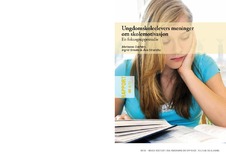| dc.contributor.author | Smette, Ingrid | |
| dc.contributor.author | Dæhlen, Marianne | |
| dc.date.accessioned | 2020-06-07T21:05:50Z | |
| dc.date.accessioned | 2021-04-29T13:59:20Z | |
| dc.date.available | 2020-06-07T21:05:50Z | |
| dc.date.available | 2021-04-29T13:59:20Z | |
| dc.date.issued | 2011 | |
| dc.identifier.isbn | 978-82-7894-373-1 | |
| dc.identifier.issn | 0808-5013 | |
| dc.identifier.uri | https://hdl.handle.net/20.500.12199/3376 | |
| dc.description.abstract | This report investigates what pupils in the 9th grade believe affect their school motivation and effort at school. The background of this study is a concern that many pupils, both high and low achievers, are unable to realize their potential for learning in secondary schools. For pupils with poor grades, this seems to have particularly negative consequences. Previous research has found that the relatively high drop-out rates in the Norwegian upper secondary school is partly to be explained by low grades from lower secondary school and of pupils not having acquired the necessary skills before entering upper secondary school. The purpose of this report is to obtain the pupils’ opinions about what contributes to their school motivation and educational effort. To investigate this, we conducted eight focus group interviews and nine individual interviews. We talked to a total of 52 pupils at two different schools. We asked the pupils about various aspects of school life. In addition, we explored the importance of parents and other aspects of the lives of young people for school motivation and efforts. Four major findings stand out as central to this report: 1) The majority of the pupils asks for variation in activities during the school day and have clear opinions about how a good teacher should be. Variation during the school day and characteristics of the teachers are more important for motivation and effort among the low achievers compared to the high achievers. 2) Many pupils relate their own school performance and school motivation to grades and remarks. A hope for good grades influences several pupils to do their homework and to work hard at school. On the contrary, several low achieving pupils state that grades have reduced their motivation for school work. 3) High achievers have a high status among peers, and none of the participants in this study seem critical to the role education plays in the society. 4) The majority of the pupils claims that there is too much homework and they experience a dilemma between homework and their leisure activities. Organized leisure activities are justified as something important and acceptable to prioritize. Activities like watching TV, playing computer games and chatting online are described mainly as temptations. | en |
| dc.description.abstract | Hva mener ungdomsskoleelever motiverer til innsats på skolen? I denne rapporten undersøker vi hvordan elever knytter egen skolemotivasjon og skoleinnsats til ulike sider ved skolehverdagen. Vi viser hvordan ulike elever vurderer betydningen av lærere, undervisningsformer og karakterer for egen motivasjon og innsats på skolen. Vi undersøker også hvordan elevene kobler skoleinnsats til forhold utenfor skolen, først og fremst til fritidsaktiviteter og foreldre. Til slutt i denne rapporten drøfter vi på hvilken måte elevenes holdninger til utdanning og deres framtidsplaner påvirker skoleinnsats og skolemotivasjon. Datamaterialet er fokusgruppeintervjuer og individuelle intervjuer med elever på 9. trinnet. | no_NB |
| dc.publisher | Oslo Metropolitan University - OsloMet: NOVA | |
| dc.relation.ispartofseries | NOVA Rapport 4/11 | |
| dc.subject | NOVA | |
| dc.title | Ungdomskoleelevers meninger om skolemotivasjon | no_NB |
| dc.type | Report | |
| fagarkivet.author.link | https://www.oslomet.no/om/ansatt/isme | |
| fagarkivet.author.link | https://www.oslomet.no/om/ansatt/marida | |
| fagarkivet.source.pagenumber | 97 | |
